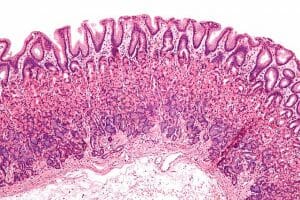Mucous Membrane Definition
A mucous membrane, also known as a mucosa (plural: mucosae), is a layer of cells that surrounds body organs and body orifices. It is made from ectodermal tissue. Mucous membranes can contain or secrete mucus, which is a thick fluid that protects the inside of the body from dirt and pathogens such as viruses and bacteria. Many different mucous membranes exist, such as mucous membranes in the respiratory system, digestive system, and reproductive system.
Difference Between the Words Mucous and Mucus
Mucous, as in mucous membrane, is spelled differently than mucus. What’s the difference? Mucus is a noun; it is a word describing the fluid secretion from a mucous membrane. Mucus gets its name from the Latin word mucus, meaning snot or slime. Mucous, on the other hand, is an adjective; it is a word describing a membrane which produces or contains mucus.
Functions of Mucous Membranes
In general, the functions of mucous membranes are to protect the body from being infected by viruses and bacteria and to keep the tissues of the body adequately moisturized. Specific mucous membranes have specialized functions. For example, the gastric and intestinal mucosae are involved with digestion and absorption of food. The nasal and olfactory mucosae help odors to break down in the nose so that their particles can be detected and the substance can be smelled. Mucosae are also found in reproductive organs like the vagina; naturally occurring vaginal discharge is produced by the vaginal mucosa to self-clean and keep the vagina moist.
Examples of Mucous Membranes
Mucosae of the Digestive System
The mouth, tongue, esophagus, stomach, and intestines are all lined with mucous membranes. These membranes are referred to as the oral mucosa, esophageal mucosa, gastric mucosa, and intestinal mucosa. Oral mucosa is found in the mouth, and changes in its condition can be signs of vitamin deficiencies, diabetes, or a result of long-term use of tobacco or alcohol. There are three types of oral mucosa: lining, masticatory, and specialized. Lining mucosa lines surfaces such as the soft palate and the floor of the mouth. The masticatory mucosa provides a firmer surface for chewing, while the specialized mucosa is found on the tongue and contains the taste buds. The esophageal mucosa secretes mucus that protects the esophagus from abrasion by food. The gastric mucosa, found in the stomach, produces mucus, digestive enzymes, and cells that stimulate acid production in order to break down food. The intestines are lined with intestinal mucosa, which absorbs nutrients from food and also absorbs water.

This is a microscope image of the gastric mucosa.
Mucosae of the Respiratory System
The nasal mucosa is the lining of the nasal cavity. It moistens air that is coming into the body during inhalation. It is commonly affected during the common cold, and during a cold more mucus than normal is produced; this creates the symptoms of a stuffy, runny nose. The olfactory mucosa is located in the upper nasal cavity and helps us smell. Mucous membranes also line the bronchi of the lungs, where gas exchange takes place. If someone has asthma, their bronchial mucosa can become inflamed, making their bronchi more likely to spasm. This causes a temporary decline in lung functioning.
Mucosae of the Reproductive System
Mucosae are also found in organs of the reproductive system. The vaginal mucosa lines the vagina and secretes fluid that helps keep the vagina moist. The uterus also contains mucosa which is called endometrium. The endometrium has a layer that thickens so that a fertilized egg may implant in it; if fertilization does not occur, this lining is shed during the menstrual cycle.
The penis also has mucosa which is called penile mucosa or preputial mucosa. Preputial mucosa specifically refers to the mucosa on the inside of the prepuce (foreskin). The function of the preputial mucosa is to maintain moisture levels. This mucosa is largely removed during circumcision, so in males that have been circumcised, this moisture is lost and the glans penis is drier.
Related Biology Terms
- Orifice – An opening in the body, such as the mouth; it is often lined by a mucous membrane.
- Ectoderm – The outermost layer of cells in a developing embryo that goes on to form structures like the skin, nerves and mucous membranes.
- Mastication – Breaking down food with the teeth, i.e., chewing.
- Endometrium – The mucosa of the uterus.
Quiz
1. What is the difference between mucous and mucus?
A. Mucous is an adjective that describes the mucous membrane, while mucus is a noun.
B. Mucus is an adjective that describes the mucus membrane, while mucous is a noun.
C. Mucus is only found in the nose, while mucous is found in other areas of the body.
D. Mucous is only found in the nose, while mucus is found in other areas of the body.
2. Which mucosa is not part of the digestive system?
A. Oral mucosa
B. Gastric mucosa
C. Preputial mucosa
D. Esophageal mucosa
3. Which is not a function of a mucous membrane?
A. To lubricate the vagina
B. To absorb nutrients from food
C. To keep the body dry
D. To help break down odors so that they may be detected and smelled
